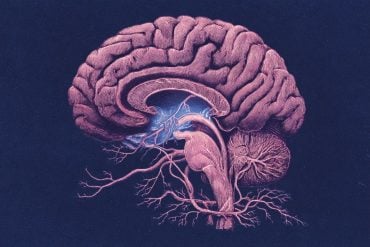Summary: Encouraging children to indulge in reading for pleasure can enhance their cognitive and mental health during adolescence, a recent study reveals.
The research, involving over 10,000 young adolescents from the US, discovered that an optimal reading duration of 12 hours per week contributed to improved brain structure and mental health.
The pleasure of reading fostered better verbal learning, memory, and speech development and showed signs of reduced stress, depression, and behavioral issues.
Key Facts:
- Early reading for pleasure shows a strong correlation with positive cognitive development and mental wellbeing in adolescents.
- An optimal weekly reading duration of around 12 hours appears to benefit young readers, with improvements tapering off beyond this point.
- Adolescent readers showed larger total brain areas and volumes, especially in regions linked to cognitive functions and mental health.
Source: University of Cambridge
Children who begin reading for pleasure early in life tend to perform better at cognitive tests and have better mental health when they enter adolescence, a study of more than 10,000 young adolescents in the US has found.
In a study published today in Psychological Medicine, researchers in the UK and China found that 12 hours a week was the optimal amount of reading, and that this was linked to improved brain structure, which may help explain the findings.

Reading for pleasure can be an important and enjoyable childhood activity. Unlike listening and spoken language, which develop rapidly and easily in young children, reading is a taught skill and is acquired and developed through explicit learning over time.
During childhood and adolescence, our brains develop, making this an important time in which to establish behaviours that support our cognitive development and promote good brain health. However, until now it has been unclear what impact – if any – encouraging children to read from an early age will have on their brain development, cognition and mental health later in life.
To investigate this, researchers from the universities of Cambridge and Warwick in the UK and Fudan University in China looked at data from the Adolescent Brain and Cognitive Development (ABCD) cohort in the US, which recruited more than 10,000 young adolescents.
The team analysed a wide range of data including from clinical interviews, cognitive tests, mental and behavioural assessments and brain scans, comparing young people who began reading for pleasure at a relatively early age (between two and nine years old) against those who began doing so later or not at all. The analyses controlled for many important factors, including socio-economic status.
Of the 10,243 participants studied, just under a half (48%) had little experience of reading for pleasure or did not begin doing so until later in their childhood. The remaining half had spent between three and ten years reading for pleasure.
The team found a strong link between reading for pleasure at an early age and a positive performance in adolescence on cognitive tests that measured such factors as verbal learning, memory and speech development, and at school academic achievement.
These children also had better mental wellbeing, as assessed using a number of clinical scores and reports from parents and teachers, showing fewer signs of stress and depression, as well as improved attention and fewer behavioural problems such as aggression and rule-breaking.
Children who began reading for pleasure earlier also tended to spend less screen time – for example watching TV or using their smartphone or tablet – during the week and at weekends in their adolescence, and also tended to sleep longer.
When the researchers looked at brain scans from the adolescent cohort, they found that those participants who had taken to reading for pleasure at an early age showed moderately larger total brain areas and volumes, including in particular brain regions that play critical roles in cognitive functions.
Other brain regions that were different among this group were those that have been previously shown to relate to improved mental health, behaviour and attention.
Professor Barbara Sahakian from the Department of Psychiatry at the University of Cambridge said: “Reading isn’t just a pleasurable experience – it’s widely accepted that it inspires thinking and creativity, increases empathy and reduces stress.
“But on top of this, we found significant evidence that it’s linked to important developmental factors in children, improving their cognition, mental health, and brain structure, which are cornerstones for future learning and well-being.”
The optimal amount of reading for pleasure as a young child was around 12 hours per week. Beyond this, there appeared to be no additional benefits.
In fact, there was a gradual decrease in cognition, which the researchers say may be because it suggests they are spending more time sedentary and less time at other activities that could be cognitively enriching, including sports and social activities.
Professor Jianfeng Feng from Fudan University in Shanghai, China, and the University of Warwick, UK, said: “We encourage parents to do their best to awaken the joy of reading in their children at an early age.
“Done right, this will not only give them pleasure and enjoyment, but will also help their development and encourage long-term reading habits, which may also prove beneficial into adult life.”
Funders included: Wellcome and the National Institute for Health & Care Research (UK) and the National Natural Science Foundation of China.
About this reading and neurodevelopment research news
Author: Craig Brierley
Source: University of Cambridge
Contact: Craig Brierley – University of Cambridge
Image: The image is credited to Neuroscience News
Original Research: Open access.
“Early-Initiated Childhood Reading for Pleasure: Associations with Better Cognitive Performance, Mental Well-being and Brain Structure in Young Adolescence” by Barbara Sahakian et al. Psychological Medicine
Abstract
Early-Initiated Childhood Reading for Pleasure: Associations with Better Cognitive Performance, Mental Well-being and Brain Structure in Young Adolescence
Background
Childhood is a crucial neurodevelopmental period. We investigated whether childhood reading for pleasure (RfP) was related to young adolescent assessments of cognition, mental health, and brain structure.
Methods
We conducted a cross-sectional and longitudinal study in a large-scale US national cohort (10 000 + young adolescents), using the well-established linear mixed model and structural equation methods for twin study, longitudinal and mediation analyses. A 2-sample Mendelian randomization (MR) analysis for potential causal inference was also performed. Important factors including socio-economic status were controlled.
Results
Early-initiated long-standing childhood RfP (early RfP) was highly positively correlated with performance on cognitive tests and significantly negatively correlated with mental health problem scores of young adolescents.
These participants with higher early RfP scores exhibited moderately larger total brain cortical areas and volumes, with increased regions including the temporal, frontal, insula, supramarginal; left angular, para-hippocampal; right middle-occipital, anterior-cingulate, orbital areas; and subcortical ventral-diencephalon and thalamus.
These brain structures were significantly related to their cognitive and mental health scores, and displayed significant mediation effects. Early RfP was longitudinally associated with higher crystallized cognition and lower attention symptoms at follow-up. Approximately 12 h/week of youth regular RfP was cognitively optimal.
We further observed a moderately significant heritability of early RfP, with considerable contribution from environments. MR analysis revealed beneficial causal associations of early RfP with adult cognitive performance and left superior temporal structure.
Conclusions
These findings, for the first time, revealed the important relationships of early RfP with subsequent brain and cognitive development and mental well-being.






